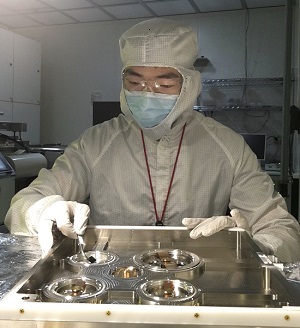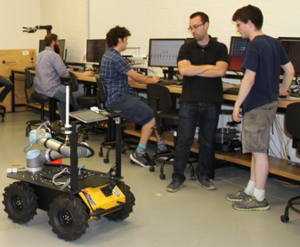PhD Program

The PhD degree requires 90 credit hours of graduate study, 60 of these being beyond a master’s degree. All PhD students must take and pass 24 credits of ECE graduate-level coursework in the first year. The 4 + 2 course requirement has four ECE graduate-level courses from their concentration area and at least two ECE graduate-level course from other concentration areas.
ECE Seminar Series (required registration): ECE 597-1 ECE Colloquium.
Students should attend four ECE Seminars each semester. These continue to be scheduled on a Wednesday in the Computer Studies Building, room 601, 12:00-1:00 PM. There will be a sign in sheet available for attendance.
 | The Comprehensive Examination, to be completed by the end of the second semester of study, is required for continuation in the PhD program. Students may petition to extend the time for completing these requirements. Part-time students and those with a non-ECE background may need additional time. |
| A PhD student can be awarded the MS in electrical engineering as part of the PhD program. Completing 24 course credits and 6 research credits will meet the required 30 credits for the MS (non-thesis) degree. The Comprehensive Examination will complete the MS Final Exam requirement for the MS degree. | |
 | All graduate students matriculated for the PhD degree are required to perform a certain amount of teaching assistance as part of their education. Teaching experience deepens and enriches a student’s understanding of the discipline and provides invaluable professional training and is, therefore, considered to be a vital component of any PhD program. The ECE department requires two semesters of TA experience. |
For information about financial aid and applying to the PhD program, see the applying page. For more information about program requirements contact the graduate administrator.
Proposal/Qualifyer Requirements
All doctoral students must pass a PhD qualifying examination and submit a written PhD thesis proposal in their third to fourth year of full-time graduate study.
Students who pass the PhD qualifying examination will get thesis research assistance from the Faculty Thesis Advisory Committee. The student's research advisor serves as chair. The committee meets with the student at least once each year.
Doctoral Thesis Examination
The final requirement in earning a PhD degree is the completion and defense of the doctoral dissertation. A minimum of six months must be between the qualifyer/proposal date and the final defense date.
Understanding the steps and associated deadlines in the dissertation submission and degree conferral process is necessary to establish a successful plan. See the Graduate Education and Postdoctoral Affairs page for complete descriptions of the defense process.
Areas of Concentration and Research
The Department of Electrical and Computer Engineering PhD graduate research program will be partitioned into five main areas of concentration and research:
- Signals, Communication, and Imaging:
- Signal and image processing
- Communications
- Medical imaging
- Machine learning and Artificial Intelligence
- Integrated Electronics and Computer Engineering:
- VLSI/IC Microelectronics
- Computer design/architecture
- Physical electronics, electromagnetism, and quantum engineering:
- Superconductivity and solid-state electronics
- Optoelectronics
- Integrated photonics
- Microelectromechanics and electrostatics
- Audio and Acoustics:
- Music acoustics and signal processing
- Acoustic waves
- Audio electronics and software design
- Robotics:
- Motion planning
- Navigation
- Control
- Estimation
- Perception

Students will take four graduate-level classes in their chosen concentration area and at least two graduate-level courses from one of the other concentration areas. The specific courses will be selected by each individual student and their research advisor. Research for credit may begin once these course requirements are completed.
Signals, Machine Learing, Artificial Intelligence, Communication, and Imaging
- Signal research on:
- Wide-band radar and sonar systems design
- Digital image and video processing
- Very low bitrate video compression
- Medical image processing
- Machine Learning and Artificial Intelligence research on:
- Understanding of the foundations and practical applications of ML and AI
- Enabling computers to learn from data and perform tasks that typically require human intelligence
- Recognizing patterns, making decisions, designing circuits, and understanding natural language.
- Communications research on:
- Frequency hopping codes for multiple-access-spread-spectrum communications, designed to minimize interference in radar and sonar systems
- Digital image processing research on:
- Image enhancement and restoration
- Image segmentation/recognition
- Processing of magnetic resonance images
- Digital video processing research on:
- 2-D and 3-D motion estimation techniques
- Deformable motion analysis
- Stereoscopic image analysis
- Standards conversion and high-resolution image reconstruction
- Object-based methods for very low bitrate video compression
- Biomedical signal processing research on:
- Spectral analysis in one-, two-, and three-dimensional spaces
- Analysis and algorithms for computed tomography
- Inverse scattering techniques for imaging tissue characterization
Integrated Electronics and Computer Engineering
Students in this program work in a variety of VLSI/IC microelectronics and computer design research areas. Some of the current research being conducted here at Rochester includes:
- Research in VLSI and CAE to address topics in integrated circuit design methodologies and automation.
- Specific system-oriented research including an analytical model for multi-access protocols with prioritized messages and distributed control architecture.
- Testability studies that explore operational parallelism in any testing process to determine the set of automated test procedures which minimizes the silicon area consumed by the built-in self-test structures.
- Applying VLSI design and analysis techniques to develop ultrafast superconducting digital integrated circuits.
- Designing and analyzing high performance VLSI-based digital and analog integrated circuits and their systems. Specifically, speed, area, and power dissipation tradeoffs are investigated in terms of application-specific constraints and their fundamental circuit level limitations.
Physical Electronics, Electromagnetism, and Quantum Engineering
In a new and ever-changing landscape of electronics needs, there has been a strong focus to work with deeply scaled nanoelectronic transistors and to go beyond conventional Si-based transistors entirely. New technologies such as spintronics, 2D electronics, phase-change electronics, neuromorphic electronics, superconducting electronics and topological electronics are becoming more important in defining what the next 50 years of electronics looks like from the device level up.
Students in this program work in a variety of next generation nanoelectronic device research areas. Some of the current research being conducted here at Rochester includes:
- Nanoelectronic devices with 2D van der Waals-bonded materials (graphene, transition metal dichalcogenides, phosphorene, etc…).
- Heteroepitaxial growth of new electronic materials, or heteroepitaxial assembly of 2D vdW electronic materials.
- Novel spintronic and magnetic devices with unconventional magnetic materials or unconventional device constructs.
- Topological electronic devices implemented with quantum electronic materials.
- Implementing new superconducting devices, along with the design/fabrication/testing of superconducting digital integrated circuits. Applications may include quantum computing or ultra high speed digital electronics.
- Using picosecond electrical and optical pulses to probe the transient response of semiconducting and superconducting devices, such as Metal-Semiconductor-Metal (MSM) photodiodes and tunnel junctions.
Information processing with optical pulses allows for high data rates than electronic signals. Optoelectronics research is focused on obtaining a detailed understanding of ultrafast phenomena and ultrafast nonlinearities in semiconductors and high-temperature superconductors, and at using silicon quantum dots and nanometer-size objects in optoelectronics and biosensing.
Students in this program work in a variety of optoelectronic research areas. Some of the current research being conducted here at Rochester includes:
- Using laser technology, solid-state physics, materials science, and device physics and engineering to design novel optoelectronic devices.
- Studying electron and hole thermalization and recombination in semiconductors and semiconductor quantum wells, and the optoelectronic properties of porous silicon, which unlike crystalline silicon emits light efficiently at room temperature.
Determining response times using laser processing of Y-Ba-Cu-O epitaxial thin films into oxygen-rich (superconducting) and oxygen-poor (semiconducting) regions, together with pump-probe femtosecond reflectivity measurements.
Audio and Acoustics
Students in this program work in a variety of acoustic research areas. Some of the current research topics here at Rochester include:
- Acoustic wave equation
- Plane, spherical, and cylindrical wave propagation
- Reflection and transmission at boundaries
- Normal modes
- Absorption and dispersion
- Radiation from points, spheres, cylinders, pistons, and arrays
- Diffraction
- Nonlinear acoustics
- Music Acoustics
- Internet-enabled music telepresence and immersive audio environments
- Musical source separation and automated music transcription
- Physical modeling musical sound synthesis
- Music representations
- Audio watermarking
- Quantitative studies of muscial timbre
Robotics
 Students in this program will develop an understanding of systems, models, and algorithms for how robots make decisions about how to interact with the physical world from sensor information and prior knowledge. Students may also conduct fundamental research in theoretical or experimental robotics to improve the performance of such systems in a wide range of applications. Students will additionally develop practical skills such as robotics software development and physical experimentation techniques through hands-on laboratory exercises and research activities.
Students in this program will develop an understanding of systems, models, and algorithms for how robots make decisions about how to interact with the physical world from sensor information and prior knowledge. Students may also conduct fundamental research in theoretical or experimental robotics to improve the performance of such systems in a wide range of applications. Students will additionally develop practical skills such as robotics software development and physical experimentation techniques through hands-on laboratory exercises and research activities.
Students in this program may participate in a wide range of research including
- Guidance, navigation, and control of unmanned ground vehicles
- Symbol grounding for human-robot interaction and teaming
- Reinforcement learning for underactuated robot control
- Perception for robot intelligence
- Control systems for robotically assisted medical imaging
